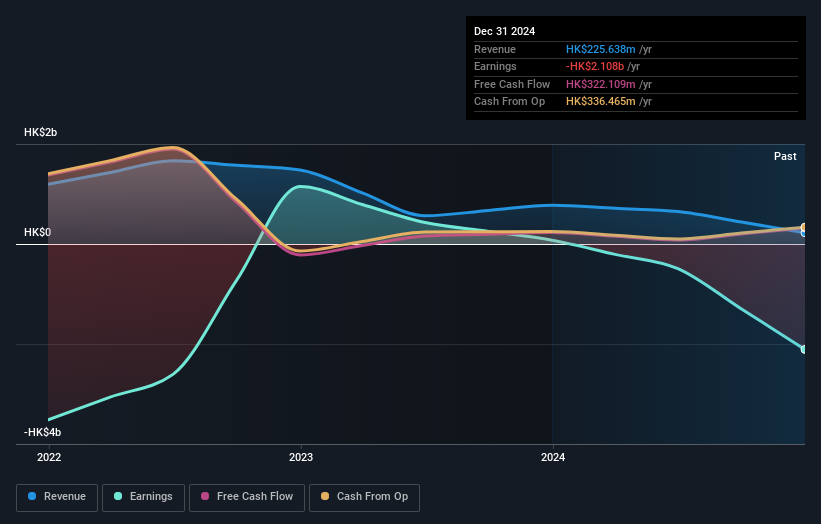- Hong Kong
- /
- Real Estate
- /
- SEHK:127
Chinese Estates Holdings Limited's (HKG:127) most bullish insider, CEO Hoi-Wan Chan must be pleased with the recent 14% gain

Key Insights
- Insiders appear to have a vested interest in Chinese Estates Holdings' growth, as seen by their sizeable ownership
- Hoi-Wan Chan owns 50% of the company
- Using data from company's past performance alongside ownership research, one can better assess the future performance of a company
A look at the shareholders of Chinese Estates Holdings Limited (HKG:127) can tell us which group is most powerful. And the group that holds the biggest piece of the pie are individual insiders with 75% ownership. That is, the group stands to benefit the most if the stock rises (or lose the most if there is a downturn).
As a result, insiders were the biggest beneficiaries of last week’s 14% gain.
In the chart below, we zoom in on the different ownership groups of Chinese Estates Holdings.
See our latest analysis for Chinese Estates Holdings

What Does The Lack Of Institutional Ownership Tell Us About Chinese Estates Holdings?
Institutional investors often avoid companies that are too small, too illiquid or too risky for their tastes. But it's unusual to see larger companies without any institutional investors.
There are multiple explanations for why institutions don't own a stock. The most common is that the company is too small relative to funds under management, so the institution does not bother to look closely at the company. It is also possible that fund managers don't own the stock because they aren't convinced it will perform well. Institutional investors may not find the historic growth of the business impressive, or there might be other factors at play. You can see the past revenue performance of Chinese Estates Holdings, for yourself, below.

Hedge funds don't have many shares in Chinese Estates Holdings. Looking at our data, we can see that the largest shareholder is the CEO Hoi-Wan Chan with 50% of shares outstanding. This implies that they possess majority interests and have significant control over the company. Investors usually consider it a good sign when the company leadership has such a significant stake, as this is widely perceived to increase the chance that the management will act in the best interests of the company. In comparison, the second and third largest shareholders hold about 25% and 0.4% of the stock. Interestingly, the second-largest shareholder, Ming-Wai Lau is also Top Key Executive, again, pointing towards strong insider ownership amongst the company's top shareholders.
Researching institutional ownership is a good way to gauge and filter a stock's expected performance. The same can be achieved by studying analyst sentiments. As far as we can tell there isn't analyst coverage of the company, so it is probably flying under the radar.
Insider Ownership Of Chinese Estates Holdings
The definition of an insider can differ slightly between different countries, but members of the board of directors always count. The company management answer to the board and the latter should represent the interests of shareholders. Notably, sometimes top-level managers are on the board themselves.
Most consider insider ownership a positive because it can indicate the board is well aligned with other shareholders. However, on some occasions too much power is concentrated within this group.
Our information suggests that insiders own more than half of Chinese Estates Holdings Limited. This gives them effective control of the company. That means they own HK$1.8b worth of shares in the HK$2.5b company. That's quite meaningful. Most would be pleased to see the board is investing alongside them. You may wish todiscover (for free) if they have been buying or selling.
General Public Ownership
The general public-- including retail investors -- own 25% stake in the company, and hence can't easily be ignored. While this group can't necessarily call the shots, it can certainly have a real influence on how the company is run.
Next Steps:
While it is well worth considering the different groups that own a company, there are other factors that are even more important. Be aware that Chinese Estates Holdings is showing 1 warning sign in our investment analysis , you should know about...
Of course this may not be the best stock to buy. Therefore, you may wish to see our free collection of interesting prospects boasting favorable financials.
NB: Figures in this article are calculated using data from the last twelve months, which refer to the 12-month period ending on the last date of the month the financial statement is dated. This may not be consistent with full year annual report figures.
New: AI Stock Screener & Alerts
Our new AI Stock Screener scans the market every day to uncover opportunities.
• Dividend Powerhouses (3%+ Yield)
• Undervalued Small Caps with Insider Buying
• High growth Tech and AI Companies
Or build your own from over 50 metrics.
Have feedback on this article? Concerned about the content? Get in touch with us directly. Alternatively, email editorial-team (at) simplywallst.com.
This article by Simply Wall St is general in nature. We provide commentary based on historical data and analyst forecasts only using an unbiased methodology and our articles are not intended to be financial advice. It does not constitute a recommendation to buy or sell any stock, and does not take account of your objectives, or your financial situation. We aim to bring you long-term focused analysis driven by fundamental data. Note that our analysis may not factor in the latest price-sensitive company announcements or qualitative material. Simply Wall St has no position in any stocks mentioned.
About SEHK:127
Chinese Estates Holdings
Chinese Estates Group (the "Group") is one of the leading property developers in Hong Kong.
Adequate balance sheet and fair value.
Market Insights
Community Narratives



